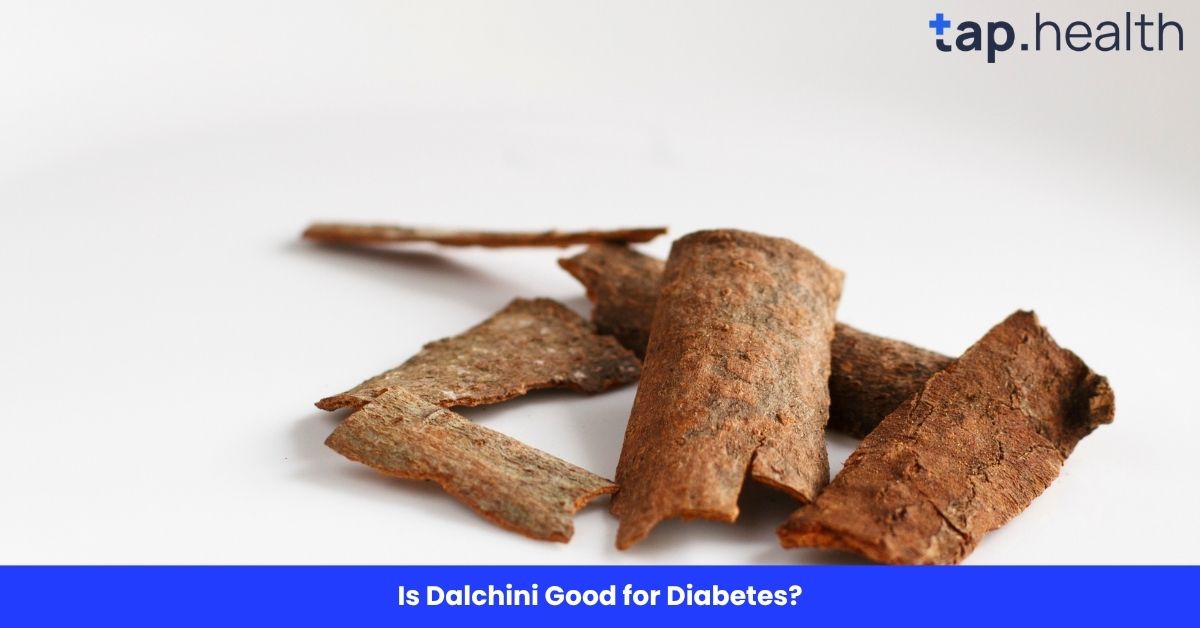Dalchini, commonly known as cinnamon, is a popular spice used in many cuisines worldwide. It is especially common in Indian kitchens, where it adds a distinct flavor to dishes and drinks. But, besides its culinary uses, dalchini has long been touted for its health benefits. One of the most common claims is that dalchini can help manage diabetes, a chronic condition that affects millions globally.
If you have diabetes or are concerned about your blood sugar levels, you may have wondered: Is dalchini good for diabetes? In this article, we’ll explore the benefits of dalchini for managing diabetes, the science behind it, and how you can include it in your diet. We’ll also provide answers to some frequently asked questions to give you a comprehensive understanding of this spice’s role in diabetes management.
What is Dalchini (Cinnamon)?
Dalchini, or cinnamon, is a spice derived from the inner bark of trees from the Cinnamomum genus. It has a strong, aromatic flavour and is often used in both sweet and savoury dishes. There are two main types of cinnamon:
- Cinnamomum cassia (Cassia Cinnamon): This is the more common variety found in most supermarkets, particularly in India.
- Cinnamomum verum (Ceylon Cinnamon): Also known as “true cinnamon,” this variety is less common but is considered to be of higher quality.
Cinnamon has been used for thousands of years in traditional medicine for various ailments. More recently, research has pointed to its potential in managing blood sugar levels, making it especially popular among those with diabetes.
How Does Dalchini (Cinnamon) Affect Blood Sugar Levels?
To understand whether dalchini is good for diabetes, it’s important to know how it can affect blood sugar. Cinnamon contains compounds, particularly cinnamaldehyde, that have been shown to influence several processes in the body that regulate blood sugar.
1. Improves Insulin Sensitivity
One of the primary ways dalchini helps with diabetes is by improving insulin sensitivity. Insulin is a hormone that helps the body use glucose (sugar) for energy. In people with Type 2 diabetes, the body becomes resistant to insulin, making it harder to manage blood sugar levels.
Research suggests that cinnamon can mimic insulin’s effects, improving the body’s ability to respond to this hormone. By making the cells more sensitive to insulin, cinnamon may help lower blood sugar levels and improve overall glucose metabolism.
2. Reduces Insulin Resistance
In addition to improving insulin sensitivity, dalchini has been shown to reduce insulin resistance. This is particularly beneficial for people with Type 2 diabetes, as insulin resistance is one of the key factors in the development of the condition.
By enhancing the action of insulin and making the cells more receptive to it, dalchini helps in reducing the amount of insulin required to maintain normal blood sugar levels. This can help manage diabetes more effectively.
3. Slows the Breakdown of Carbohydrates
Cinnamon has also been found to slow the rate at which carbohydrates are broken down in the digestive system. This means that glucose from food is absorbed more slowly, preventing sharp spikes in blood sugar after meals. This can help control post-meal blood sugar levels, which is especially important for people with diabetes.
4. Has Antioxidant and Anti-inflammatory Properties
Chronic inflammation and oxidative stress are common in people with diabetes, and they contribute to the development of complications such as heart disease and nerve damage. Dalchini is rich in antioxidants, which can help reduce inflammation and oxidative stress in the body. These properties can help prevent diabetes-related complications over time.
Scientific Research on Dalchini and Diabetes
Numerous studies have been conducted to understand the effects of dalchini on blood sugar levels and diabetes management. Let’s take a look at some of the key findings from scientific research.
1. Study on Cinnamon and Type 2 Diabetes
A well-known study published in the Diabetes Care journal found that cinnamon supplementation significantly reduced blood sugar levels in people with Type 2 diabetes. Participants who took cinnamon daily for 40 days had a noticeable reduction in fasting blood glucose levels compared to those who took a placebo.
2. Effect on HbA1c Levels
Another study explored the effect of cinnamon on HbA1c levels, which is a long-term indicator of blood sugar control. The results showed that cinnamon supplementation reduced HbA1c levels, which means it helped participants achieve better long-term blood sugar control.
3. Anti-inflammatory Effects
A study published in the Journal of Nutritional Biochemistry found that cinnamon could help reduce markers of inflammation in individuals with diabetes. Since chronic inflammation is a known factor in the development of diabetes-related complications, this effect could be important in protecting against long-term damage.
4. Impact on Lipid Profile
Cinnamon has also been shown to have a positive effect on cholesterol and lipid levels. One study found that cinnamon supplementation improved cholesterol levels, particularly reducing total cholesterol and LDL (“bad” cholesterol). This can be beneficial for people with diabetes, as they are at a higher risk of heart disease.
How to Use Dalchini (Cinnamon) for Diabetes?
Now that we know dalchini can be beneficial for managing diabetes, the next question is: How should you use cinnamon to gain these benefits? Here are some practical ways to incorporate dalchini into your daily diet.
1. Add It to Your Morning Tea or Coffee
One of the easiest ways to include dalchini in your diet is by adding a pinch of ground cinnamon to your tea or coffee. This simple addition can provide a flavourful boost while also helping to regulate blood sugar levels.
2. Sprinkle It on Your Oatmeal or Smoothies
You can also sprinkle cinnamon on your oatmeal, yogurt, or smoothies for a nutritious and diabetes-friendly breakfast. Cinnamon pairs well with fruits like apples, bananas, and berries, all of which can help stabilize blood sugar levels.
3. Use It in Curries and Dishes
Dalchini is a common spice in Indian cooking, so adding it to your curries, stews, or soups is an easy way to enjoy its health benefits. It not only enhances flavour but may also help manage your blood sugar.
4. Cinnamon Supplements
If you find it difficult to incorporate cinnamon into your meals, you can also take cinnamon supplements. These are available in capsule or powder form and are specifically designed to provide the therapeutic benefits of cinnamon.
5. Cinnamon Tea
Cinnamon tea is another popular way to enjoy its benefits. To make cinnamon tea, simply steep a cinnamon stick in hot water for a few minutes. You can add a bit of honey if you prefer sweetness, but make sure to monitor your blood sugar levels as honey can raise blood sugar.
Potential Side Effects of Cinnamon
While dalchini can be beneficial for people with diabetes, it’s important to use it in moderation. Excessive consumption of cinnamon, especially Cassia cinnamon (which is more commonly available), can lead to the accumulation of coumarin, a compound that can cause liver damage when consumed in large amounts over time.
1. Liver Damage
Consuming large quantities of Cassia cinnamon may increase the risk of liver damage due to high levels of coumarin. To avoid this risk, it is advisable to use Ceylon cinnamon (true cinnamon), which contains lower levels of coumarin.
2. Allergic Reactions
Some individuals may be allergic to cinnamon. If you experience symptoms like skin rashes, swelling, or difficulty breathing after consuming cinnamon, discontinue use and consult a healthcare professional.
3. Blood Sugar Levels
Cinnamon can help lower blood sugar levels, but it’s important to monitor your blood sugar regularly. If you are on medication for diabetes, cinnamon may enhance the effect of your medication, potentially causing your blood sugar to drop too low. Always consult your doctor before adding cinnamon supplements to your routine.
Real-Life Scenario
Ravi, a 45-year-old with type 2 diabetes, started adding a small pinch of cinnamon powder to his morning tea and oatmeal. Along with maintaining a balanced diet and regular exercise, he noticed better blood sugar readings over a few months. His doctor confirmed that the improvement was due to consistent lifestyle management, with cinnamon offering an added benefit.
Expert Contribution
According to studies published in the Journal of Diabetes Science and Technology, cinnamon may:
- Reduce fasting blood glucose levels
- Improve insulin response
- Lower LDL (bad) cholesterol and triglycerides
- Boost HDL (good) cholesterol
Nutrition experts also caution against overconsumption of cassia cinnamon (the most common type), as it contains coumarin, which can affect liver health in large amounts.
Recommendations Grounded in Proven Research and Facts
- Use Ceylon cinnamon (true Dalchini) for regular use — it’s safer and lower in coumarin.
- Stick to ½–1 teaspoon per day — more isn’t necessarily better.
- Combine with healthy habits — balanced meals, physical activity, and doctor-approved medication are essential.
- Avoid supplements without guidance — some cinnamon capsules may have varying quality or dosage.
- Monitor your sugar levels — always track blood glucose when adding new foods to your diet.
How Tap Health Can Help You Manage Diabetes Better
Tap Health is designed to make diabetes care simpler, smarter, and more personalized. With its AI-powered tools and real-time insights, it helps you take full control of your health every day.
Here’s how Tap Health supports you:
- Smart Meal Tracking: Take a picture of your meal and instantly get accurate carb and calorie counts, helping you make better food choices.
- Personalized Diet Guidance: Get meal recommendations tailored to your blood sugar goals and preferences.
- Glucose Monitoring Made Easy: Track your blood sugar readings and view clear trends to understand what affects your levels most.
- AI Health Coaching: Receive 24/7 support and expert-backed advice for managing food, exercise, sleep, and stress.
- Medication & Reminder Alerts: Never miss a dose or check—Tap Health keeps you on schedule effortlessly.
- Actionable Insights: The app analyzes your data and offers simple, effective tips to help you stay consistent and motivated.
Frequently Asked Questions (FAQ) on Is Dalchini Good for Diabetes?
1. Is dalchini (cinnamon) good for people with diabetes?
Yes, dalchini (cinnamon) has been shown to have positive effects on blood sugar control, insulin sensitivity, and reducing inflammation. It can be a helpful addition to a diabetes-friendly diet when used in moderation.
2. How much cinnamon should I take for diabetes?
While there is no specific dosage, studies have shown that 1 to 2 teaspoons (2-4 grams) of cinnamon per day can provide health benefits for people with diabetes. You can add it to your meals, tea, or smoothies.
3. Can cinnamon lower blood sugar immediately?
Cinnamon can help lower blood sugar levels over time, but it is not an immediate fix. It works gradually by improving insulin sensitivity and slowing the absorption of glucose. It should be part of a comprehensive diabetes management plan.
4. Is Ceylon cinnamon better than Cassia cinnamon?
Yes, Ceylon cinnamon (true cinnamon) is considered safer and healthier than Cassia cinnamon because it contains lower levels of coumarin, a compound that can cause liver damage when consumed in large quantities.
5. Can I take cinnamon if I am on diabetes medication?
Cinnamon can enhance the effect of diabetes medication, potentially causing low blood sugar levels. Always consult with your healthcare provider before adding cinnamon to your routine, especially if you are on medication for diabetes.
Conclusion
Dalchini (cinnamon) is more than just a flavourful spice—it has potential health benefits for people with diabetes. Research suggests that cinnamon can help regulate blood sugar levels, improve insulin sensitivity, and reduce inflammation. When consumed in moderation, it can be a valuable addition to a diabetes-friendly diet.
If you have diabetes, consider incorporating dalchini into your meals, tea, or smoothies, but always be mindful of the quantity and consult your doctor, especially if you’re on diabetes medication. By using cinnamon wisely, you can enjoy its many benefits while managing your diabetes effectively.


